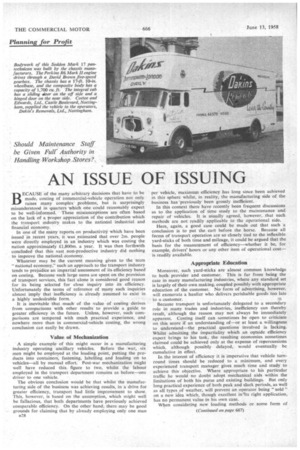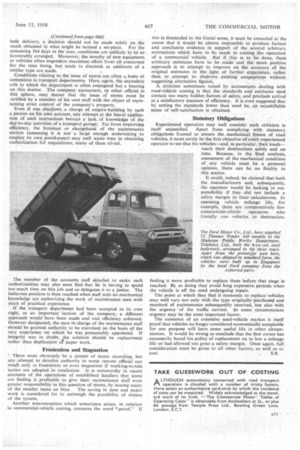AN ISSUE OF ISSUING
Page 62

Page 65

If you've noticed an error in this article please click here to report it so we can fix it.
BECAUSE of the many arbitrary decisions that have to be made, costing of commercial-vehicle operation not only raises many complex• problems, but is surprisingly misunderstood in quarters -which one could reasonably expect to be well-informed. These misconceptions are often based on the lack of a proper appreciation of the contribution which the transport industry makes to the national industrial and
financial economy. '
In one of the many reports. on productivity which have been issued in recent years, it was estimated that over 2m. people were directly employed in an industry which was costing the nation approximately £1,800m. a year. It was then forthwith concluded that this vast non-productive industry did nothing to improve the national economy.
Whatever may be the current meaning given to the term "national economy," such an approach to the transport industry tends to prejudice an impartial assessment of its efficiency based on costing. Because such large sums are spent on the provision of transport services, this fact alone is considered good reason for its being selected for close inquiry into its efficiency. Unfortunately the terms of reference of many such inquiries almost imply that inefficiency is already assumed to exist in a highly undesirable form.
It is inevitable that much of the value of costing derives from comparisons with other results to provide a guide to greater efficiency in the future. Unless, however, such comparisons are tempered with much practical experience, and nowhere more than in commercial-vehicle costing, the wrong conclusion can easily be drawn.
Value of Mechanization A simple example of this might occur in a manufacturing industry operating ancillary vehicles. Before the war, six men might be employed at the loading point, putting the products into containers, fastening, labelling and loading on to vehicles—all by manual effort. Post-war mechanization might well have reduced this .figure to two, whilst the labour employed in the transport department remains as before—one driver to one vehicle.
The obvious conclusion would be that whilst the manufacturing side of the business was achieving results, in a drive for greater efficiency, transport had little improvement to show. This, however, is based on the assumption, which might well be fallacious, that both departments have previously achieved comparable efficiency. On the other hand, there may be good grounds for claiming that by already employing only one man a28 per vehicle, maximum efficiency has long since been achieved in this sphere whilst, in reality, the manufacturing side of the business has 'previously been grossly inefficient.
In this context there have recently been frequent discussions as to the application of time study to the maintenance and repair of vehicles. It is usually agreed, however, that such methods are not readily applicable to the operational side.
Here, again, a good case could be made out that such -a conclusion is to put the cart before the horse. Because all forms of transport operation are so closely tied to the inflexible yard-sticks of both time and mileage, it could be argued that the basis for the measurement of efficiency—whether it be, for example, drivers' hours or any other item of operational cost— is readily available.
Appropriate Education
Moreover, such yard-sticks are almost common knowledge to both provider and customer. This is far from being the case in many manufacturing industries, where any standard set is largely of their own making, coupled possibly with appropriate education of the customer. No form of advertising, however, will exonerate a haulier who delivers perishable goods too late to a .customer.
Because transport is unfortunately delegated to a secondary role in many trades and industries, inefficiency can thereby result, although the reason may not always be immediately apparent. Costing itself can sometimes be open to criticism on this score if an understanding of—or at least a willingness to understand—the practical questions involved is lacking. Whilst admitting the impartiality which an outside efficiency expert brings to his task, the resulting economies sometimes claimed could be achieved only at the expense of repercussions which, although possibly delayed, would eventually be cumulative in effect.
In the interest of efficiency it is imperative that vehicle turnround times should be reduced to a minimum, and every experienced transport manager gives much time and study to achieve this objective. Where appropriate to his particular traffic he would no doubt adopt mechanical aids within the limitations of both his purse and existing buildings. But only long practical experience of both peak and slack periods, as well as all types of weather, will prevent an operator being " sold " on a new idea which, though excellent irOits right application, has no permanent value in his own case.
When considering new loading methods or some form of
bulk delivery, a decision should not be made solely on, the result obtained in what might be termed a set-piece. For the remaining 364 days in the year, conditions are unlikely to be so. favourably arranged. Moreover, the novelty of new equipment,. or vehicles often -engenders maximum effort from all concerned for the time being, but tends to diminish as additions of a similar type are made.
Conditions relating to the issue of stores are often a..bone of contention.in,transport departments. Here, again, the. secondary role to vyhich the department is often consigned has a 'bearing on this matter. The company accountant, or other official in this sphere, may decree that the issue of stores must be certified by a member of his own staff with the object of maintaining strict control of the company's property.
Even if one disallows a charge of empire-building by such a person on his own account, any attempt at the literal .application of Rich instructions betrays a' lack of knowledge of the day-to-day activities of a transport garage. Far from improving efficiency, the foreman. or chargenand of the maintenance section (assuming it is not a large enough undertaking to employ its own storekeeper) may well waste time in obtaining authorization -for requisitions, many of them trivial.
The member of the accounts staff detailed to make such authorizations may also soon find that he is having to spend too much time on this job and so delegates it to a junior. The ludicrous position is then reached when staff with no mechanical knowledge are authorizing the work of maintenance men with years of practical experience.
If the transport department had been accepted in its own right, as an important 'section of the company, a different approach would have been made and real efficiency achieved. However designated, the man in charge of the maintenance staff should be granted authority to be exercised on the basis of the Very experience on which he was presumably appointed. If integrity was in doubt, the solution should be replacement rather than duplication A paper work.
Frustration and Stagnation
^ There must obviously be a system of stores recording, but any attempt to devolve authority to some remote official can result only in frustration or even stagnation if working-to-rule tactics are adopted in retaliation. It is noteworthy in recent accounts of the operations of established hauliers that some are finding it profitable to give their maintenance staff even greater responsibility in this question of stores, by issuing many of the smaller items en bloc. The saving in time and paper work is considered far to outweigh the possibility of misuse of the system. .
Another misconception which sometimes arises, in relation to commercial-vehicle costing, concerns the word ".proof." If this is demanded in the literal sense, it must be conceded at the outset that it would be almost impossible to produce factual and conclusive evidence in support of the several arbitrary estimations which have to be .made in costing the operation of a commercial vehicle: But if this is to be done, these arbitrary estimates have to be made and the more positive approach is to attempt to improve on the accuracy of the original estimates in the light of further experience, rather than to „attempt to disprove existing assumptions without suggesting alternative figures. A criticism sometimes raised by accountants dealing with road-Vehicle costing is that the standards and estirnates used contain too many hidden factors of safety, and preclude arrival at a satisfactory measure of efficiency. It is even suggested that by setting the standards lower than need be, an unjuAtifiable sense of self-satisfaction is obtained.
Statutory Obligations
Experienced operators may well consider such criticism is itself unjustified. Apart from complying with statutory obligations framed to ensure the, mechanical fitness of road vehicles, it must surely be the first objective of every experienced operator to see that his vehicles—and, in particular, their loads— reach their destinations safely and on time. Because, in the final analysis, assessment of the mechanical condition of any vehicle must be a personal opinion, there can be no finality in this matter.
It could, indeed, be claimed that both the manufacturers and, subsequently, the operator would be lacking in responsibility if they did not include a safety margin in their calculations, In assessing vehicle mileage life, for example, there are comparatively few commercial-vehicle operators who literally run vehicles to destruction, finding it more profitable to replace them before that stage is reached. By so doing they avoid long expensive periods when the vehicle is off the road undergoing repair.
The point at which they find it economic to replace' vehicles may well vary not only with the type originally purchased and standard of maintenance subsequently received, but also with the urgency of the traffic carried. In some circumstances urgency may be the most important factor.
The existence of an extensive used-vehicle market is itself proof that vehicles no longer considered economically acceptable for one purpose will have some useful life in other circumstances. It would be wrong to conclude that the first owner has necessarily based his policy of replacement on to low a mileage life or had allowed too great a safety margin. Once again, full consideration must be given to all other factors, as well as to cost. S.B.




































































































